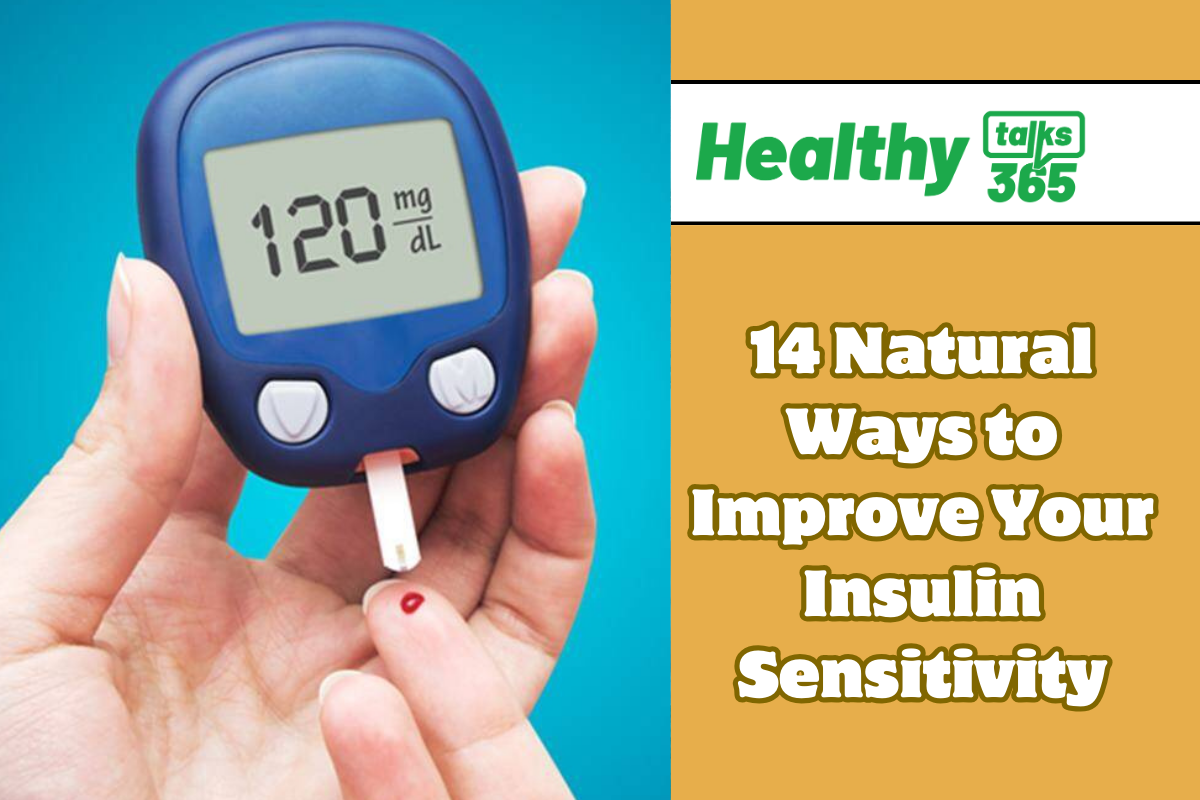14 Natural Ways to Improve Your Insulin Sensitivity
1. Eat good food to improve insulin
Eating good food is really important for improving insulin sensitivity and controlling blood sugar levels. It’s all about choosing the right kinds of foods that are full of nutrients and don’t cause big spikes in blood sugar.
Eating lots of fruits, veggies, whole grains, lean proteins, and healthy fats is a great way to improve how well insulin works in your body. These foods are packed with fiber, vitamins, and minerals that help keep blood sugar levels steady and promote better insulin sensitivity.
Fiber, found in foods like fruits, veggies, beans, and whole grains, is especially helpful because it slows down how fast sugar gets into your bloodstream. This means your body doesn’t have to release as much insulin to deal with it.
2. Keep your junk food low to improve your insulin
Limiting how much junk food you eat can really help make your body better at using insulin and keep you healthier overall. Junk foods, like sugary snacks and fried stuff, can make your blood sugar levels go up really fast, which isn’t good for your body.
When you eat junk food, your body quickly breaks down the sugars and simple carbs in them, causing a sudden rise in blood sugar levels. This makes your pancreas release a lot of insulin to bring your blood sugar back down. But if you eat junk food too often, your body can become resistant to insulin, meaning it doesn’t work as well anymore.
By cutting back on junk food and choosing healthier options, like fruits, veggies, whole grains, lean meats, and good fats, you can help keep your blood sugar levels steady and make your body more sensitive to insulin. This can also help you manage your weight and lower your risk of health problems like diabetes and heart disease.
3. Avoid sugar and white stuff to improve your insulin
Avoiding sugar and refined carbohydrates, which are often called “white stuff,” can be really helpful for making your body better at using insulin and keeping you healthier overall. These kinds of foods are broken down quickly by your body, which makes your blood sugar levels go up fast.
When you eat sugar and refined carbs like white bread, white rice, and sugary snacks, your body turns them into glucose, causing a big spike in blood sugar levels. To deal with this, your pancreas releases insulin to help move the glucose from your blood into your cells for energy or storage.
But if you eat too much sugar and refined carbs all the time, your body can become resistant to insulin, which means it doesn’t work as well anymore. This can lead to high blood sugar levels, which is not good for your health.
Read Also:
Focus While Studying: 10 Proven Methods
4. Use herbs and good fats to improve your insulin
Using herbs and adding good fats to what you eat can really help make your body better at using insulin and keep you healthier overall. Herbs are packed with good stuff like antioxidants and other plant nutrients that can help reduce inflammation and stress in your body, which can make your insulin work better.
Some herbs, like cinnamon, fenugreek, and ginger, have been shown to be especially helpful for improving insulin sensitivity and lowering blood sugar levels. For example, cinnamon can make your cells more sensitive to insulin and help them take in sugar better.
Adding healthy fats to your diet, like the ones in avocados, nuts, seeds, and olive oil, can also improve insulin sensitivity and reduce inflammation in your body. Healthy fats are important for keeping your cells healthy and helping your body make hormones like insulin.

5. Include green veggies in your food to improve your insulin
Adding green vegetables to your meals is a smart move if you want to improve how well your body uses insulin. Veggies like spinach, kale, broccoli, and Brussels sprouts are packed with important stuff like vitamins, minerals, and antioxidants, which can really help keep your blood sugar levels steady.
Green vegetables are low in calories and carbs but high in fiber, which is super helpful for preventing quick spikes in blood sugar. Fiber slows down how fast sugars are absorbed into your bloodstream, which means your body doesn’t have to release as much insulin.
These veggies also contain things like magnesium and chlorophyll, which have been shown to make your body more sensitive to insulin and lower the risk of type 2 diabetes.
6. Make your plate more colorful to increases your appetite as this’ll increase insulin
Having more colorful fruits and vegetables to your plate can indeed make you feel hungrier, but it’s not directly related to increasing insulin levels. Instead, what you eat and how much of it you consume mainly affect insulin.
A variety of colorful fruits and veggies on your plate is a great idea because they’re packed with important stuff like vitamins, minerals, and antioxidants. These foods can help keep you healthy and feeling good.
Colorful fruits and veggies are usually low in calories and high in fiber, which means they can fill you up and keep you satisfied for longer. This can be helpful if you’re trying to manage your weight.
Read Also:
11 Best Ways to Improve Your Digestion
7. Start including exercises in your daily routine to improve your insulin
Adding exercise to your daily routine is a great way to help your body use insulin better and stay healthier overall. Exercise helps your body use insulin more efficiently by helping your cells take in glucose, which lowers your blood sugar levels.
Exercise doesn’t have to be hard or complicated. It can be as simple as taking a walk, doing some gardening, or riding your bike. The important thing is to find activities you enjoy and can do regularly.
Regular exercise not only improves how well your body uses insulin but also helps you manage your weight, reduce inflammation, and lower your risk of getting serious health problems like type 2 diabetes and heart disease.
8. Start taking more sleep to improve your insulin
Getting enough sleep is super important for your health, including how well your body uses insulin. When you don’t get enough sleep, it can mess with your body’s ability to control blood sugar levels and use insulin properly.
When you sleep, your body gets a chance to rest and repair itself, including the cells that make insulin. But when you don’t sleep enough, this process can get messed up, leading to insulin resistance. This means your body doesn’t respond as well to insulin, and your blood sugar levels can go up.
Not getting enough sleep can also mess with hormones that control hunger and fullness, making you crave unhealthy foods and possibly gaining weight. This can make insulin resistance worse and increase your chances of getting type 2 diabetes.

9. Try out intermittent fasting to improve your insulin
Trying intermittent fasting (IF) means you eat during specific times and fast during others. Some research suggests this could be helpful for making your body better at using insulin and controlling blood sugar.
When you fast, your body goes through changes that might improve how sensitive it is to insulin and help reduce insulin resistance. Fasting also helps your body repair itself and produces ketones, which can improve insulin sensitivity.
Intermittent fasting might also help with weight loss, which is good for improving insulin sensitivity. By eating fewer calories during fasting times, you might end up losing weight. Since carrying extra weight can make insulin resistance worse, losing weight can help make your body more sensitive to insulin.
10. Include more nutrients in your diet to improve your insulin
Adding more nutrients to your diet can really help your body use insulin better and keep your blood sugar levels stable. Nutrient-rich foods give your body all the important stuff it needs to work well.
Focusing on foods like fruits, veggies, whole grains, lean meats, and healthy fats can give your body the right nutrients to function properly. These foods are usually low in bad stuff like added sugars and unhealthy fats, which can mess with how well your body responds to insulin.
Some nutrients, like magnesium and chromium, are especially helpful for making your body more sensitive to insulin and keeping your blood sugar levels in check.
11. Increase your fibre intake
Boosting your fiber intake can really help improve how well your body uses insulin and manages blood sugar levels. Fiber is a type of carb found in plant foods that your body can’t break down. Instead, it moves through your digestive system slowly, which is good for your health.
Fiber slows down how fast sugar gets into your bloodstream after you eat, which means your body doesn’t need as much insulin to handle it. This can make your body more sensitive to insulin and help keep your blood sugar levels steady.
Eating foods that are high in fiber is also great for managing your weight because they’re filling but low in calories. And keeping a healthy weight is important for making your body more sensitive to insulin.
Read Also:
12. Add vinegar in your diet to improve your insulin
Adding vinegar to your diet might help improve how well your body handles insulin and manages blood sugar levels. Some studies suggest that vinegar, especially apple cider vinegar, could have positive effects on how your body processes glucose and responds to insulin.
Vinegar seems to slow down how fast your body digests carbs, especially when you eat a meal high in carbs. This means that glucose from carbs gets released into your bloodstream more slowly, which can help keep your blood sugar levels from spiking too much after meals.
Also, vinegar might help make your muscles more sensitive to insulin, which is a good thing because it means your body can use glucose more efficiently.
13. Include strength training in your routine to improve your insulin
Incorporating strength training into your regular routine can be highly beneficial for improving insulin sensitivity and overall health. Strength training exercises, such as lifting weights or using resistance bands, can help increase muscle mass and improve muscle quality.
Muscles play a critical role in glucose metabolism, as they are responsible for the majority of glucose uptake in the body. By increasing muscle mass through strength training, you can enhance your body’s ability to utilize glucose and improve insulin sensitivity.
Additionally, strength training can have a positive impact on blood sugar levels, even outside of exercise sessions. When you engage in strength training regularly, your muscles become more efficient at using glucose for energy, leading to better blood sugar control throughout the day.

14. Drink healthy drinks such as coconut water to improve your insulin
Drinking healthy beverages like coconut water can be a good choice for staying hydrated. While coconut water contains natural electrolytes like potassium and magnesium, which can be good for your body, it’s not clear if it directly affects how well your body uses insulin.
Staying hydrated is important because it helps your body work well and can indirectly help with managing blood sugar levels. If you’re not drinking enough fluids, it can affect how sensitive your body is to insulin and increase the chances of having high blood sugar levels.
Choosing coconut water over sugary drinks like soda or fruit juice can be a healthier option because it’s low in calories and doesn’t have added sugars. It’s a natural way to replenish electrolytes without the extra sugar.




